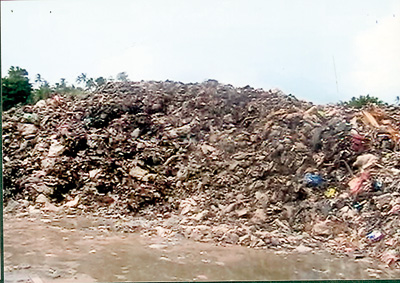News
Grand garbage plan creates stink in Rathgama
The carbonic fertiliser manufacturing project begun by the Central Environmental Authority (CEA) in the Monrovia Estate in Rathgama has become a blight on the area with epidemic swarms of flies and mosquitoes bringing illness and distress to local villagers.

The mound of rubbish
Diarrhoea and vomiting have become common in the area, and one former worker at the project has been diagnosed with tuberculosis. The grounds of the project, named Pilisaru, reek strongly of fermenting garbage. The project was begun on January 26, 2012 with the intention that garbage from seven provincial institutions within the Galle District would be converted into fertiliser there. The CEA spent Rs. 80 million on Pilisaru, sited on a 20-acre property. More than Rs. 2 million was spent on building a 2km road to transport the garbage.
Construction went ahead on the understanding that the CEA would supply sanitary landfill that would form a cover for the garbage. Yet now, four years after construction, no steps have been taken to employ sanitary landfill.Due to the lack of this resource only a small amount of rubbish, (15 tonnes out of the 40 tonnes brought daily), is converted into fertiliser. The rest, says former chairman of the Rathgama Pradeshiya Sabha, T. Nimal, adds to the already gargantuan garbage mountain.
Each day, seven tractors from the Hikkaduwa Urban Council, four tractors from the Poddala Pradeshiya Sabha and two tractors from the Navy Camp in Boossa bring in garbage and a good 9,000 tonnes is added each year to the heaps of refuse, constituted mostly of material that cannot be converted, including plastics, glass and polythene.

A table covered by flies
Mr. T. Nimal said the project had not been a necessity and that the Rathgama Pradeshiya Sabha had its own centre to produce carbonic fertiliser. “After this new project began, that centre was closed,” he said.He said that the Monrovia estate project has not been equipped with machinery to sort out types of garbage. “Only 10 workers are employed where about 20 are required. Because there is no machinery to sort out the garbage a lot of garbage goes unused.
“There is now a garbage mountain spreading over two acres, and it has become a breeding ground for mosquitoes and flies which have become a threat of epidemic proportions,” Mr Nimal said. He said people even take their meals under mosquito nets, so great is the problem in Rathgama, Ranapanadeniya, Hamburu Ela, Kaaku Kande, Polgahadeniya, the Monrovia Estate and Mavadavila.
When it rains, water from the garbage dump seeps into farms, and farmers develop sores on their legs.“Even creating a temporary sanitary landfill here will take up about Rs. 10 million but this will not be enough to dispose of the garbage heap already accumulated here,” Mr. Nimal said. “Korea has agreed to build a permanent sanitary landfill but their people will arrive only in two years time, and building it up will take more years. Does the public have to suffer for all those years?”

Sumitra seeks the protection of a mosquito net to have a meal away from the hovering flies
Resident A.H. Sumitra de Silva, 50, of Polgahadeniya on the Monrovia Estate, said life used to be peaceful. “But after the fertiliser project was initiated swarms of flies invaded our homes. We have to put up with the smell. Our children get diarrhoea frequently. Children can’t even study. We eat as well as sleep under mosquito nets.”
Another local mother, S. Sivaguru of Ranapanadeniya, Hamburugala said her children were frequently ill. “From morning till six in the evening flies plague us; from 6 till morning it’s mosquitoes,” said 65-year-old Karunawathi of Ranapanadeniya. “Flies cover and contaminate our food, our water – everything. Visitors to our houses don’t like to even drink tea from us. We can’t even give a dhane because monks don’t like to visit.
“We are constantly prey to diarrhoea and vomiting. Health officials don’t even visit us. “Life has become so unendurable that some people have left the area altogether.”

